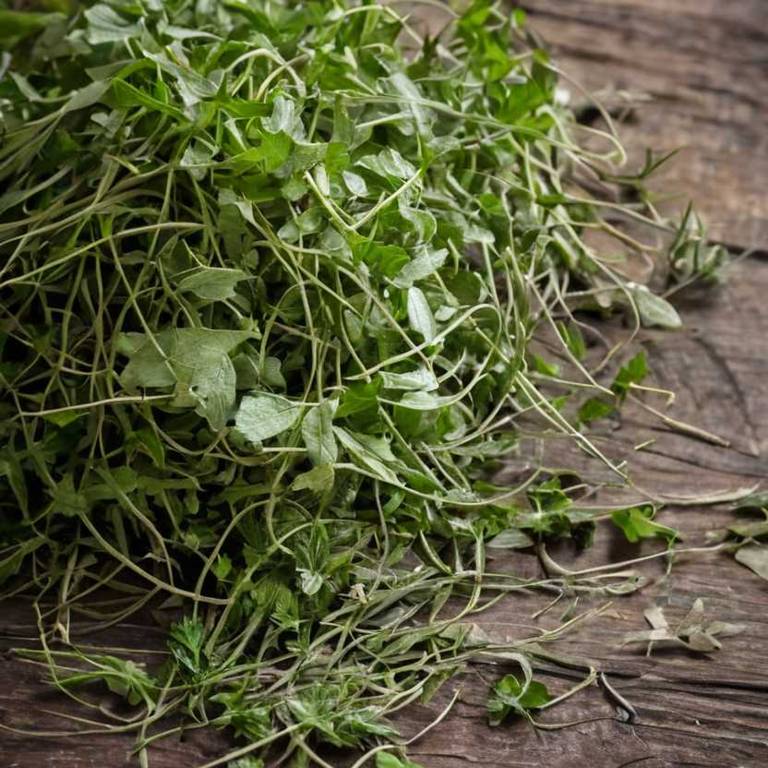10 Best Achyranthes Bidentata Preparations

The best medicinal preparations of Achyranthes bidentata are decoctions, teas, tinctures, capsules, and creams, each offering unique benefits for various health conditions.
Decoctions involve boiling the root to extract its active compounds, while teas provide a gentler method of consumption.
Tinctures offer concentrated extracts for faster absorption, and capsules ensure convenient and standardized dosing.
Creams are commonly used topically to alleviate pain and inflammation.
These preparations are widely utilized in traditional medicine for their anti-inflammatory, analgesic, and diuretic properties.
Below there's a list of the 10 best herbal preparations of achyranthes bidentata for medicinal purposes.
- 1. Decoctions
- 2. Teas
- 3. Tinctures
- 4. Capsules
- 5. Creams
- 6. Mucillages
- 7. Oinments
- 8. Oils
- 9. Syrups
- 10. Lozenges
1. Decoctions
Achyranthes bidentata decoctions is commonly used to promote circulation, alleviate pain, and support kidney function in traditional medicine.
These decoctions are often employed to treat conditions such as arthritis, lower back pain, and urinary tract issues. The bioactive constituents responsible for its medicinal properties include flavonoids, alkaloids, and polysaccharides, which exhibit anti-inflammatory, analgesic, and nephroprotective effects. Additionally, the decoctions may help in improving blood flow and reducing swelling.
This herbal preparation has been widely utilized in both traditional Chinese medicine and Ayurvedic practices for its therapeutic benefits.

2. Teas
Achyranthes bidentata teas is commonly used to promote blood circulation, relieve pain, and support kidney health.
This herbal preparation is often used to treat conditions such as arthritis, menstrual cramps, and lower back pain. It is also believed to aid in the treatment of urinary tract infections and improve overall vitality. The bioactive constituents responsible for its medicinal properties include flavonoids, saponins, and polysaccharides, which have anti-inflammatory, antioxidant, and immunomodulatory effects.
These compounds contribute to its ability to reduce inflammation and enhance bodily functions.

3. Tinctures
Achyranthes bidentata tinctures is commonly used to treat ailments related to the musculoskeletal system, such as joint pain, arthritis, and inflammation.
These tinctures are also used to improve circulation, alleviate menstrual cramps, and support kidney health. The most common medicinal uses include reducing inflammation, easing pain, and promoting blood flow. The bioactive constituents responsible for these effects include flavonoids, saponins, and iridoids, which have anti-inflammatory, analgesic, and antioxidant properties.
These compounds work synergistically to provide the therapeutic benefits associated with Achyranthes bidentata tinctures.

4. Capsules
Achyranthes bidentata capsules is commonly used to promote circulation, alleviate pain, and support joint health.
They are frequently employed in traditional medicine to treat conditions such as arthritis, lower back pain, and menstrual disorders. The capsules are also used to improve kidney function and reduce inflammation. The bioactive constituents responsible for these effects include compounds like rosmarinic acid, flavonoids, and polysaccharides, which exhibit anti-inflammatory, antioxidant, and analgesic properties.
These components work synergistically to enhance the therapeutic benefits of the herbal preparation.

5. Creams
Achyranthes bidentata creams is commonly used to alleviate pain and inflammation associated with musculoskeletal disorders.
This herbal preparation is frequently applied topically to treat conditions such as arthritis, muscle pain, and joint inflammation. The most common medicinal uses include reducing swelling, improving circulation, and promoting tissue repair. The bioactive constituents responsible for these effects include alkaloids, saponins, and flavonoids, which possess anti-inflammatory and analgesic properties.
These compounds work synergistically to provide relief from various inflammatory and painful conditions.

6. Mucillages
Achyranthes bidentata mucillages is commonly used to promote wound healing, reduce inflammation, and support digestive health.
This herbal preparation is widely utilized in traditional medicine to treat ailments such as ulcers, skin infections, and gastrointestinal disorders. The mucillages contain bioactive constituents like polysaccharides, mucilage, and flavonoids, which contribute to its therapeutic effects. These compounds exhibit anti-inflammatory, antioxidant, and antimicrobial properties.
Additionally, the preparation is believed to aid in detoxification and enhance the body's natural healing processes.

7. Oinments
Achyranthes bidentata oinments is commonly used to treat musculoskeletal disorders, such as rheumatism, arthritis, and joint pain, due to their anti-inflammatory and analgesic properties.
These ointments are also applied topically to alleviate symptoms of bruises, sprains, and muscle strains. The bioactive constituents responsible for these medicinal effects include flavonoids, alkaloids, and saponins, which exhibit anti-inflammatory, antioxidant, and pain-relieving activities. Additionally, the presence of lignans and polyphenols contributes to the ointment's ability to improve circulation and reduce swelling.
This herbal preparation has been traditionally used in Chinese medicine for its ability to promote blood circulation and remove stasis, making it effective for a range of inflammatory and degenerative conditions.

8. Oils
Achyranthes bidentata oils is commonly used to treat musculoskeletal disorders, digestive issues, and skin conditions.
The oil is widely applied in traditional medicine for its anti-inflammatory, analgesic, and antimicrobial properties. It is often used to alleviate pain and stiffness in joints, reduce inflammation in the digestive tract, and promote wound healing. The bioactive constituents include fatty acids, flavonoids, and alkaloids, which contribute to its therapeutic effects.
These compounds work synergistically to provide relief from various ailments and support overall health.

9. Syrups
Achyranthes bidentata syrups is commonly used to promote circulation, alleviate pain, and support kidney function.
This herbal preparation is often used to treat conditions such as arthritis, gout, and urinary tract disorders. It is also believed to aid in the treatment of menstrual cramps and digestive issues. The bioactive constituents responsible for its medicinal properties include alkaloids, saponins, flavonoids, and polysaccharides.
These compounds contribute to its anti-inflammatory, analgesic, and diuretic effects.

10. Lozenges
Achyranthes bidentata lozenges is commonly used to alleviate symptoms of respiratory and throat conditions, such as sore throat, cough, and inflammation.
These lozenges are often employed in traditional medicine to treat ailments like pharyngitis, laryngitis, and bronchitis due to their anti-inflammatory and antimicrobial properties. The bioactive constituents responsible for these effects include compounds such as flavonoids, alkaloids, and saponins, which contribute to the plant's ability to reduce inflammation and combat microbial infections. Additionally, the lozenges may support immune function and promote healing of mucous membranes.
This herbal preparation is valued for its natural approach to managing common throat and respiratory discomforts.
